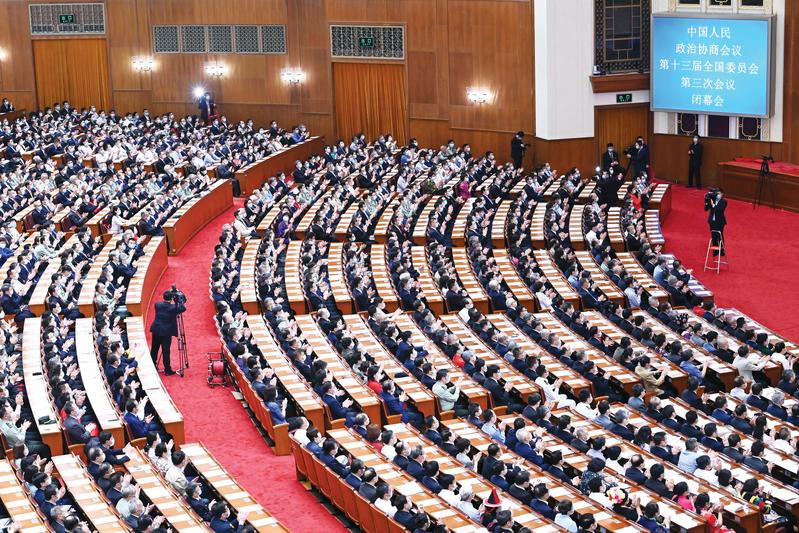Special annual meetings maintain nation’s push to eliminate poverty, achieve moderate prosperity
 The third session of the 13th National Committee of the Chinese People’s Political Consultative Conference held its closing meeting on May 27. (ZHANG LING / XINHUA)
The third session of the 13th National Committee of the Chinese People’s Political Consultative Conference held its closing meeting on May 27. (ZHANG LING / XINHUA)
The country’s top political advisory body and top legislature each concluded their postponed and shortened annual sessions within a week.
The 13th Chinese People’s Political Consultative Conference National Committee concluded its annual session on May 27. The third session of the 13th National People’s Congress, the national legislature, ended on May 28, granting the green light to the Government Work Report and passing a number of laws.
The annual sessions, dubbed the two sessions, usually last around 10 days, but this year, both national legislature and political advisory body drastically condensed the agenda and completed their work in a week.
Despite the disruption caused by COVID-19, the vigorous CPPCC and NPC discourse has maintained focus on vital issues of most concern to the people.
Premier Li Keqiang’s Government Work Report and addresses to questions from the international media on May 28 both lived up to people’s aspirations that the country is closing in on achieving the goal of building a moderately prosperous society in all aspects by the end of 2020 by giving priority to stabilizing employment, ensuring living standards, and winning the battle against poverty.
The central government has promised to eliminate poverty among all rural residents living below the current poverty line and in all poor countries this year, a goal which will be a decade in advance of realizing targets in the United Nations Sustainable Development Agenda.
This year’s two sessions were held at a critical moment for the overall promotion of epidemic prevention and control, and economic and social development.
As the pandemic appears to have peaked in most major countries, and many countries are itching to open a post-pandemic chapter, the attendees saw that China cannot afford to enter this new stage unprepared. Especially since many of the changes in a post-COVID-19 world may have to do with this country.
After the sessions, the country will also be determined to win the battle against COVID-19 fully at home and cooperate with the international community in building a community of shared public health for mankind.
The decision of the NPC on establishing and improving the legal system and enforcement mechanisms for the Hong Kong Special Administrative Region to safeguard national security is another milestone in the history of practicing the principle of “one country, two systems”.
Hong Kong is the only place on Earth that does not have a proper national security law in its statute book. The national security legislation for Hong Kong is a major move that will help safeguard national sovereignty, security and development interests, as well as Hong Kong’s long-term prosperity and stability, according to the deputies.
Meng Qinghai, deputy head of the China Association for Science and Technology, said it is imperative and pressing to establish and improve such a system and enforcement mechanisms.
Bai Chunli, president of the Chinese Academy of Sciences, said the legislative move will help consolidate the legal, social and political foundations for “one country, two systems”.
“It will certainly win the support of all Chinese people,” he said.
People witnessed another legal milestone as the country’s first civil code was adopted by the annual session of the NPC.
Sun Xianzhong, a deputy who participated in the drafting of the code, said: “I have been hoping China would have its own civil code for decades.”
Since the founding of New China in 1949, the country has made four previous attempts to legislate a civil code. The code is related to everyone’s lives and work, Sun said.
At CPPCC panel discussions, advisers called for reinforcing the country’s epidemic early-warning and response mechanisms; reiterated the pressing need to cope with the potential negative impacts of the disrupted global industrial supply chains; and stressed the importance of the decision not to extend the poverty elimination deadline. They offered straightforward assessments of the country’s outstanding weaknesses as well as urging technological self-reliance.
While political resolve may prove essential in a new world full of “changes unseen in a century”, the political advisory body, as the session has shown, has unmatched importance for people-oriented decision-making.
Contact the writers at zhangyi@chinadaily.com.cn


